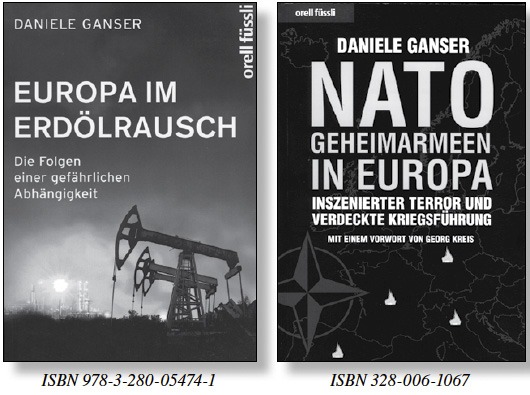“... in order to avoid stereotypical concepts of an enemy”
“... in order to avoid stereotypical concepts of an enemy”
Recommendations for a more attentive use of media
Interview with Dr Daniele Ganser, historian and peace researcher, Swiss Institute for Peace and Energy Research (SIPER)
CC. On 15 January, shortly after the attacks in Paris, the Swiss historian and peace researcher Dr Daniele Ganser gave an interview to Swiss Radio SRF1 in the broadcast “Ratgeber” (“advisor”) on how to deal with media products on disasters or terrorist attacks. Children and adolescents are exposed to such images and can judge or question them even less than adults. In the talk Daniele Ganser points out the harmful effects of horror images on the concept of man. He offers suggestions on how to counteract this development, without neglecting people’s legitimate interest to be informed about current affairs. He is strongly opposed to the fragmented bits of information which a person is unable to handle and to learn from. Daniele Ganser offers concrete suggestions on different ways of dealing with a genuine acquisition of knowledge and a realistic concept of man accessible to both parents and adolescents.
Radio SRF1: Daniele Ganser is historian and peace researcher. He is telling us we’d better not watch videos and images of disasters or terrorist attacks when they appear, even though this might sometimes prove to be difficult. If you can’t avoid seeing such a video or such images of horror, then one thing is important …
Daniele Ganser: I think one should try to sort things out. It is important to stabilise the concept of man. It is wrong to think that everybody wants to kill everybody. Like this you will get a very negative view of the world, which is not justified. One should ask oneself: Is there someone in my circle of friends who has shot someone dead? The answer is very likely: nobody. Or has anyone of my friends ever been raped? Again the usual answer is: nobody. Has anyone ever acted as a torturer? The CIA torture report has just been published giving an insight into torturing, and this is truly shocking. Here the concept of man hits rock bottom and makes you think, my neighbour is going to blow me up next. Or the boss will torture me if I … This is what it entails. In reality most people do not want to use violence, but meet up with friends, earn some money, go on a holiday, fall in love, or maybe read a book, listen to music and so on, just do normal things. This is actually what most people want. We should emphasise that man is above all a loveable and beautiful human being. The problem with these images of violence is that they create an evil concept of man. We’d better look at beautiful images, go for walks in nature, marvel at sunsets, admire the structure of beautiful leaves, talk to friendly people, this is what helps.
Still, when we hear about bad news, we want to know more. We want to know what happened, and why.
Being interested in the world is a prerequisite. We should ask ourselves what happened in a terrorist attack, why Syria is being bombarded, what the war in the Ukraine and drone attacks are about. These questions are crucial. We should be interested in the world. I think this is really precious. On the other hand I’d recommend reading non-fiction books. Someone interested in the war in Syria should read a book on Syria of maybe 300 pages, like this he would understand a lot more than by just watching a video. Or if he says no, I don’t like reading, then he should rather watch a documentary of 60 minutes, for which a team of journalists has done a lot of research. You will certainly get more information since the pieces of information are more comprehensive. The mind can process a one-hour input much better than a three-minute sequence like for example Simon Ammann’s bad luck at the last competition and tomorrow’s weather forecast, a phone call from someone who wants something, a text message ... our daily life. This fragmentation means that we remember nothing in the end. We no longer know the exact details of the Madrid attack or the London Tube, or the 9/11 attack. If you see the pictures, you have no idea who was behind it. We are unable to process these short bits of information.
You also say it is absolutely necessary to talk about such events with children aged 10 years and more. Children below the age of 10 must be spared from such terrible news. According to you, watching TV is a taboo for children below the age of 10, and above 10, adults must talk with the children about what they’ve seen and not leave them alone with it.
We should actually ask the children about what they’ve seen and how it affected them: “Do you think that many people want to kill others? Do you think there are only few? Do you think it is like this in every religion? Do you have a friend who is Muslim? Do you now believe Muslims are more violent than Christians? For example, 30,000 people died in the war of France against Libya, most of them were Muslims. Now about 12 Christians are reported to have been killed by Muslims, perhaps, we still don’t know exactly [referring to the attacks in Paris]. Who is now more violent?” We adults should start a differentiated dialogue, which can be understood by adolescents. In all religious groups there is the problem of violence, but also among atheists, like for example the RAF, who were atheists in the first place. And I think it’s crucial to talk to each other in order avoid stereotypical concepts of anenemy by pointing at someone and saying: “Yes, these are the evil guys.” •
Source: SRF1 Ratgeber, 15.01.2015.
(Translation Current Concerns)
